
Why Your Child with a Speech Delay May Benefit From Occupational Therapy
Cracking the code to language development isn’t about focusing solely on speech. It’s about understanding the whole child and how various elements, including sensory processing, impact their speech delay.
Here’s the holistic approach to speech and language development explained. I wanted to write this post because this was one of the most common questions I got from the parents I have worked
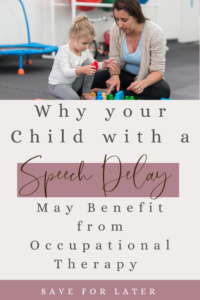
Hi! My name is Marra, and I’m a mama and a licensed pediatric occupational therapist with years of experience working with children with different developmental needs and supporting their families as they navigate the world of therapy.
I’ve practiced in both a pediatric outpatient clinic and early intervention. Early intervention provides therapy to all children ages birth to 3 who qualify for services and takes place in their home or natural environment such as daycare.
Many of the children I have worked with commonly were referred to therapy because of speech delay from either their parents or pediatrician. They were typically ages 2 to 5 years old and presented with a speech delay and no physical disability.
Often times through the evaluation process, they would qualify for both speech therapy and occupational therapy services. I would then receive the common question: If I’m concerned with my child’s speech delay, why do they also need occupational therapy?
This is a reasonable question, and the answer is not always clear. I wanted to write this post to help provide an explanation to those of you who are curious, are in this situation, and who are wondering the same thing as so many parents I’ve worked with did.
Before we get to the answer, we first need to look at two topics that are important to understand. What is occupational therapy? And what is sensory processing?
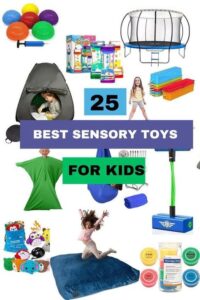
What is Occupational Therapy?
Occupational therapy is the best profession ever!!!!!! Ok, this may just be my opinion, but I’m a little obsessed with it and very passionate about the work we do.
Occupational therapy is a holistic, client-centered practice that helps individuals participate in the activities that they need and want to do.
OTs believe health and well-being are the ability to participate in the occupations we love. OTs define occupation as any activity that occupies our time.
The common occupations in childhood are play, socializing, school, sports, other meaningful activities, and activities of daily living, including eating, getting dressed, bathing, brushing teeth, and sleeping.
OTs collaborate with families to help children increase their participation in activities that are meaningful to them and their families. Ok, so what?
How does this relate to a child’s speech development? Well, before we tackle the question at hand, we first need to understand sensory processing.
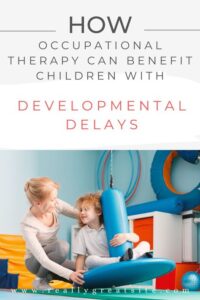
What is Sensory Processing?
Sensory processing is our ability to take in a variety of sensory input from the environment, process and make sense of all of it in order to choose the appropriate response.
We have 8 sensory systems. Yes, 8! I know we were all taught about our 5 senses: sight, sound, smell, touch, and taste, but we actually have 3 more that are less known.
Our vestibular sensory system is our sense of movement and balance. It’s how we move around our environment without falling. It’s our response to gravity. Proprioception is our sense of where our body is in space and deep pressure.
We feel proprioceptive sensory input when we jump, work out, get a massage, or a big hug. This sense is deeper than our skin. The last sense is Interoception, or how our body is feeling, hungry, hot, tired, or sick. To learn more about our 8 sensory systems, check out What is Sensory Processing.
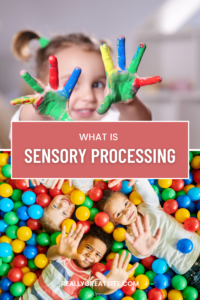
So we all process sensory information all of the time. Our brains and nervous system is being bombarded by all of this information day and night. We never get a break.
That is a ridiculous amount of information that our brain has to process, sort through, and make sense of before we are able do anything else. Ok, I know I still haven’t answered your question. We’re getting there, I promise.
HOW DOES SENSORY PROCESSING RELATE TO SPEECH DELAY?
So what does sensory processing have to do with speech development? Well, a lot! To simplify, I like to break it down into 3 steps:
-
- Step 1: Sensory information comes into the brain through our 8 sensory systems
- Step 2: Our brain processes all of the sensory information and choose what to pay attention to and what to ignore.
- Step 3: We choose a response, which can be in the form of emotion or behavior.
So, sensory processing would be Steps 1 and 2, and speech would be Step 3. We must do Step 1 and Step 2 before we can do Step 3. If we are having difficulty with Steps 1 and 2, then we will have difficulty with Step 3.
It’s important to understand that Step 1, receiving sensory information, and Step 2, processing it, are unconscious or out of our conscious control. For example, I’m going to assume that right now, your attention is on reading this article.
Let’s say you are a parent, and your child is napping or playing in their room. If they suddenly call you, scream, or cry, you will immediately switch your focus away from this article and attend to your child.
You will not think this through. It’ll happen automatically and most likely before you are even aware of it.
This is because you are effectively processing sensory information from your environment. Your brain unconsciously knows your child’s needs are more important than this article and will attend when needed.

We also filter out unneeded information. If your children are happily playing in the other room as you are reading and start to giggle, you might not lose your focus the way you would if they start crying.
The best example of this is with TV. Have you ever tried to get someone’s attention who is watching TV and they are not responding? It’s not because they are unable to hear you or are intentionally ignoring you; it’s because their brain is receiving so much sensory input from the TV that they are tuning other sensory input and are not processing it.
This leads us right into a speech delay. If a child is having difficulty processing sensory information from their environment and struggling to filter out what they need to pay attention to and what they can ignore, they are going to have a more challenging time developing speech and language.
Some children with sensory processing challenges have a difficult time maintaining a calm and regulated state where they can learn best and focus on their speech. Other children are so busy processing other information in their environments that they aren’t processing the words spoken to them.
It’s not that they are ignoring you or don’t care. It’s that their brains are busy with other tasks. Children need to effectively process the sensory input in their environments before they can understand language and use words to communicate.
It’s important to note that speech and language challenges are not always related to sensory processing. I’m just referring to children who struggle with both and that speech and sensory processing are so closely linked.
Every child is different, so it is important to consult with a speech language pathologist and an occupational therapist regarding your child’s needs and the best plan of care for them.
How Do I Know if my Child Has Sensory Processing Difficulties and if They are Related to Their Speech Delay?
Sensory processing challenges are easily overlooked. Not many people truly understand it besides occupational therapists and those who have worked closely with occupational therapists. Most pediatricians don’t necessarily understand well.
When a young child has a speech delay, that can oftentimes be the first noticeable sign that they may be struggling with their sensory processing skills, this is what I have noticed.
Parents are concerned with their child’s speech and language development, and through the evaluation process, they are referred for an occupational therapy evaluation where their sensory processing skills are assessed.
Some signs that sensory processing challenges could be related to a child’s speech and language delay may include decreased eye contact or they are not yet responding to their name.
They may also have high activity levels and difficulty attending to certain tasks and constantly move their bodies. To learn more about potential sensory processing difficulties, check out Sensory Red Flags You May be Missing.

If your child is not presenting with any of these red flags and you are not concerned with their sensory processing skills, they will likely only qualify for speech therapy.
If you think that they may be experiencing some sensory processing challenges, then you might want to advocate for an occupational therapy evaluation for your child along with the speech evaluation.
What’s the harm? They will not qualify for occupational therapy services if there are no concerns. If they do qualify and an occupational therapist could help improve their sensory processing skills, that will only benefit their speech and language development.
To learn more about what an evaluation looks like, check out this Step by Step Guide to a Pediatric Occupational Therapy Evaluation.
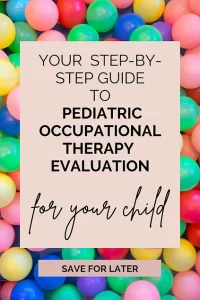
SPEECH THERAPY AND OCCUPATIONAL THERAPY CO-TREATS TO ADDRESS SPEECH DELAY
This brings us to another favorite topic of mine, Co-Treats!! I love co-treats. If your child does qualify for both speech and occupational therapy services, then it might be recommended that they participate in co-treat therapy sessions. This is a great option to work on their speech delay.
What is a co-treat? It is when the speech language pathologist and the occupational therapist work together to provide therapy services at the same time. They collaborate, plan, and carry out the treatment session together. In most cases, this can work really well. For me, this would often occur for 60 minutes 1 time a week
This brings up another frequent question I would get that you may be wondering as well. Isn’t it more worthwhile for my child to get 2 hours of therapy a week than 1 hour combined? I can see where you’re coming from, however, not necessarily.
Many times, when a child is struggling with both their sensory processing and speech development, it can work beautifully to have them participate in co-treat sessions. The occupational therapist would focus on meeting the child’s sensory needs and getting them to a calm and organized state, setting them up to work on their speech goals.
As an occupational therapist, I loved co-treating with speech therapists because I got to learn the child’s speech goals and what words or sentences to target while sharing individualized sensory strategies for the child with the speech language pathologist.

Often this worked really well. However, it is important to remember that every child is unique and has unique needs. It might be worth trying a co-treat and adjusting their plan of care accordingly.
Again, always consult with your child’s speech and occupational therapists. To learn more about speech therapy check out ASHA
I hope I answered this question and you now have a better understanding of how occupational therapy might work well with speech therapy. If you are a parent of a child in therapy or who may begin therapy, always remember that no one knows your child better than you, and only you know what’s best for your child and your family. You hold the power to advocate for your child. Please reach out with any questions or comments.
